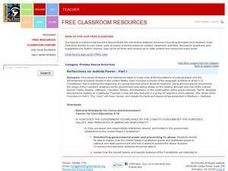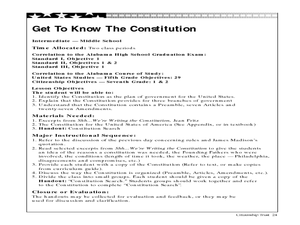James Madison Memorial Fellowship Foundation
Those "Other Rights:" The Constitution and Slavery
Did the United States Constitution uphold the institution of slavery, or did it help to destroy it? Young historians study Article 4, Section 2, Clause 3 of the Constitution and evaluate the rights of slaveowners as they compared to or...
Curated OER
The Supreme Court: The Judicial Power of the United States
Students investigate some basic facts about the Supreme Court by examining the United States Constitution and one of the landmark cases decided by that court. The operation of the Supreme Court forms the focus of the lesson.
National Endowment for the Humanities
Lesson 4 James Madison: Internal Improvements Balancing Act—Federal/State and Executive/Legislative
Who has the power? The founding fathers asked the same question when the United States was formed. Learners explore issues that arose during Madison’s presidency that raised constitutional questions. Through discovery, discussion, and...
Curated OER
The Supreme Court: The Judicial Power of the United States
Middle schoolers learn basic facts about the Supreme Court by examining the United States Constitution and one of the landmark cases decided by that court.
Curated OER
Constitutional Scavenger Hunt
Have your class learn through exploration. They use their texts and go on a US Constitutional scavenger hunt. Included are 45 questions they must hunt to find answers to. This plan uses the text as the main resource, why not give clues...
Curated OER
Presidential Powers
Students study and discuss the section of the Constitution that refers to the executive branch. They write a new section or clause describing a new duty for the president of the United States. Students define the word power and proposal.
C-SPAN
How A Bill Becomes A Law
Seven steps are required for a bill to become a United States law. The Families First Coronavirus Response Act (H.R. 6201) is used as a model for the process of how a bill becomes a law. Class members work independently through a Google...
The New York Times
Evaluating Sources in a ‘Post-Truth’ World: Ideas for Teaching and Learning about Fake News
The framers of the United States Constitution felt a free press was so essential to a democracy that they granted the press the protection it needed to hold the powerful to account in the First Amendment. Today, digital natives need to...
Curated OER
Why Does Congress Work That Way?
Students discover the powers of Congress. In this legislative branch lesson, students examine the legislative process as they analyze Article I of the U.S. Constitution. Students consider the powers of Congress as they define the role of...
Curated OER
Reflections on Judicial Power - Part I
Students research the Constitutional provision for the Judicial branch of government. They examine different U.S. founder's positions on the relative strength of the judicial branch and act as a review court for Marbury vs. Madison.
American Bar Association
What Is Separation of Powers?
Who has the power? Scholars investigate the creation of the three branches of government in the United States Constitution. They analyze just why the framers created the branches the way they did.
Curated OER
How a Bill Becomes a Law
Students examine Article I, Sections 1, 7, and 8, of the U.S. Constitution and discuss the authority and restrictions placed on the Congress in making laws.
Curated OER
Launching the New U.S. Navy
Students analyze United States Constitution, locate general references to common defense, and specific references in document to U.S. Navy. Students then respond to questions on Document Analysis Worksheet, and discuss relationship...
Judicial Learning Center
The Power of Judicial Review
Marbury v. Madison is arguably the most important landmark case in the history of the Supreme Court. A fact-filled lesson provides background information about the case and two others related to the concept of judicial review. Scholars...
Curated OER
Lesson I - Why is Delaware Called "The First State"?
High schoolers discuss why Delaware is called the First State, research background leading to Delaware's ratification of United States Constitution, complete worksheet on United States Constitution, and work in groups to choose an...
Curated OER
A More Perfect Union
Fourth graders complete a unit of lessons on the development of the U.S. government. They examine the main ideas of the Declaration of Independence, develop a class translation of the preamble to the Constitution, create a flow chart,...
Curated OER
Get To Know The Constitution
Students search the Constitution for specific information. In this Constitution lesson plan, students read the Constitution and search for the branches of government, specific Amendments, and more, in groups.
Curated OER
US Government: The Constitution
Learners explore the branches of government. In this U. S. Constitution lesson, students examine the system of checks and balances in the U.S. plan of government as they read the document and define vocabulary words.
Curated OER
Popular Sovereignty and the Lecompton Constitution
Students explore the purpose of the Lecompton Constitution. In this United States History lesson, students read several articles then complete several activities to reinforce their reading, such as a cause and effect worksheet,...
Curated OER
1930 Census and the Consitution
Students read the Constitution and discuss the importance of enumeration. In this Census lesson, students complete a Census schedule and discuss the job skills of applicants. Students research Census data to compare and contrast the...
Curated OER
A Nation's Voice
Young scholars research the Constitution and the War Powers Act in order to determine what the powers of the government are in times of conflict. They answer a series of questions then write a legal brief either supporting or condemning...
Administrative Office of the US Courts
Nomination Process
"I do solemnly swear that I will support and defend the Constitution of the United States..." Scholars investigate the nomination process of Supreme Court justices when assuming office. Through examination of primary and secondary...
Curated OER
U. S. Constitution - Elections and Terms in Office
Students explore American elections and terms in office. In this U.S. government lesson, students respond to questions about voting rights. Students then write position papers on the existence of the Electoral College.
Curated OER
Legislative Branch
Young scholars analyze Article 1 of the Constitution. They respond to the Public Criticism E-Learning module.

























